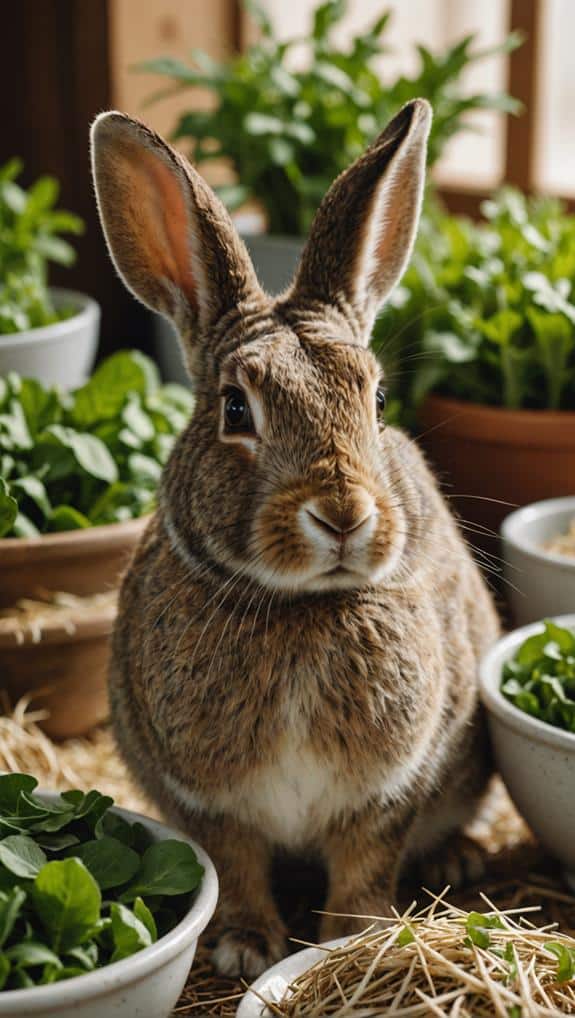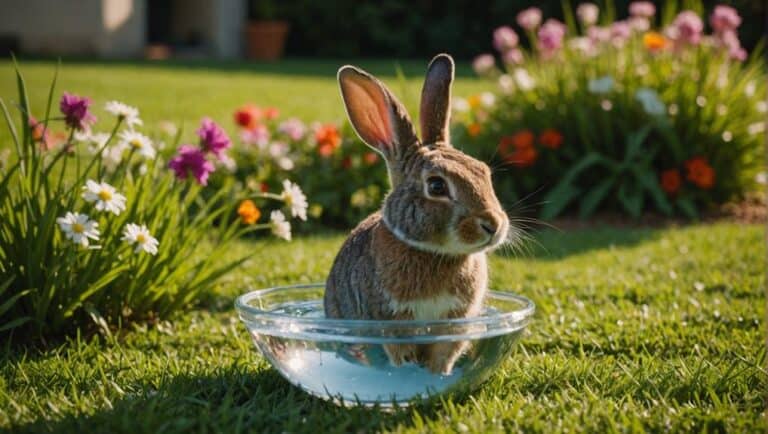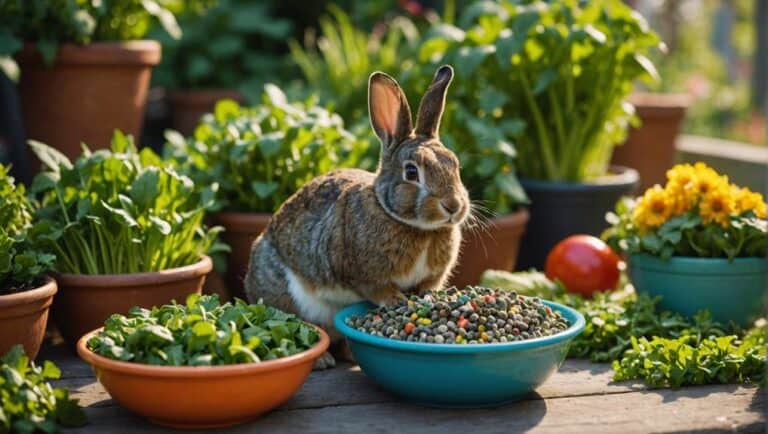It's a coincidence that just as you noticed your rabbit acting a bit off, a friend mentioned similar concerns about their pet's health. You're likely aware that nutrient deficiencies can lead to serious issues, but recognizing the subtle symptoms can be a challenge. If you see signs like a dull coat or unusual lethargy, it's important to act quickly. What if the changes in their behavior are more than just a phase? Understanding what to look for and how to respond could make all the difference in your rabbit's well-being.
Contents
Common Nutrient Deficiency Symptoms

Nutrient deficiencies in rabbits can lead to a range of concerning symptoms that directly affect their health and well-being. For instance, a deficiency in vitamin A may cause poor vision, skin issues, and respiratory infections, as it’s fundamental for maintaining epithelial tissues. Additionally, inadequate intake of calcium can result in brittle bones and dental problems, making it crucial for their overall skeletal health. Ensuring a balanced diet rich in essential nutrients is vital, especially during the early stages of life when their growth and development are rapid. For those caring for young rabbits, understanding baby rabbit nutrition essentials is key to promoting a vibrant and healthy future for these animals.
You might notice your rabbit struggling with these problems if their diet lacks this essential nutrient. A balanced diet is imperative for overall well-being and health, and ensuring they've a high-fiber diet can prevent these deficiencies.
Vitamin E deficiency can lead to infertility and muscle weakness, clearly indicating its significance for reproductive health. A balanced diet is crucial for preventing these issues.
Additionally, insufficient fiber intake can cause serious digestive problems like gastrointestinal stasis, especially when high-starch diets lead to dysbiosis.
Calcium deficiency can severely impact bone health, resulting in skeletal deformities and a heightened risk of fractures, particularly in young or pregnant rabbits.
Finally, don't overlook protein deficiency, which can stunt growth, worsen coat condition, and weaken the immune response.
Understanding these common nutrient deficiency symptoms will empower you to make informed decisions about your rabbit's diet, ensuring they receive the necessary nutrients for a healthy, vibrant life.
Identifying Risk Factors
Recognizing the risk factors that contribute to nutrient deficiencies in rabbits is essential for maintaining their health and well-being. One significant factor is the diet, which must meet the nutrient requirements of rabbits. Insufficient fiber can lead to gastrointestinal issues, while high-calcium feeds may cause urinary problems, including rabbit urinary tract infections.
Pay attention to the absence of key vitamins, particularly B vitamins, as deficiencies in these can affect energy levels and coat condition.
Monitoring calorie intake is critical; both overfeeding and underfeeding can result in obesity or malnutrition, leading to additional health complications. Environmental factors also play a role—poor housing conditions and a lack of social interaction can limit a rabbit's ability to forage for a varied diet, exacerbating nutritional deficiencies.
Regular veterinary check-ups are essential for early detection of these issues. Look out for signs like weight fluctuations, dental problems, and behavioral changes, as they often indicate underlying dietary deficiencies.
Dietary Adjustments for Prevention

Addressing dietary needs is a proactive way to assure your rabbit stays healthy and avoids nutrient deficiencies.
A balanced rabbit diet should consist of 70-80% hay, which should be high in fiber and low in calcium to support gastrointestinal health and prevent urinary issues. Incorporate a variety of fresh vegetables daily, focusing on leafy greens, which provide essential vitamins like A and K. It's important to recognize that while some believe bunnies crave carrots, their high sugar content makes them unsuitable as dietary staples. Avoid high-sugar fruits, as they can lead to obesity.
It's important to monitor protein levels, aiming for an intake of 15-19% crude protein. This helps maintain ideal health and prevents conditions like enteritis, which can arise from over-consumption of protein. Regularly assess your rabbit's diet to meet their evolving needs based on age, reproductive status, and activity level. This may require adjusting hay types and pellet quality.
Additionally, always provide continuous access to fresh, clean water. Proper water consumption is crucial, as adequate hydration greatly impacts nutrient absorption and overall metabolic health in rabbits.
Importance of Regular Check-ups
Assuring your rabbit receives regular veterinary check-ups is essential for maintaining its overall health and well-being.
These routine visits are fundamental for monitoring nutritional health and identifying any deficiencies early on. Your veterinarian can perform health assessments, including blood tests, to detect deficiencies in essential vitamins and minerals that support reproductive health and overall vitality.
It's concerning that over 37% of rabbits in some surveyed populations don't receive annual vaccinations or health check-ups. By prioritizing regular check-ups, you can help change this statistic and guarantee your rabbit thrives.
These visits also facilitate discussions about any changes in your rabbit's behavior or eating habits, which may indicate potential nutrient deficiencies or other health issues.
Additionally, consistent veterinary care plays an important role in maintaining dental health. Nutritional imbalances can lead to dental problems that require professional intervention, so addressing these issues early is paramount.
Immediate Actions to Take

Regular veterinary check-ups provide a solid foundation for your rabbit's health, but immediate actions are crucial when symptoms of nutrient deficiencies appear. If you notice a decreased appetite or abnormal cecotrope consumption, assess their diet for inadequate fiber or nutrient deficiencies. This can prevent significant health issues.
Keep an eye out for signs of obesity or poor coat condition, as these may indicate excessive high-calcium feeds or protein imbalances, necessitating an immediate dietary adjustment. Additionally, monitor your rabbit's dental health; lack of appropriate chewing materials can lead to dental disease. So, provide plenty of hay and safe chew toys to avoid complications.
If your rabbit exhibits lethargy or unusual behavior, consult a veterinarian right away. These symptoms often signify a lack of essential nutrients like vitamins A, D, and E, or they might point to serious health concerns.
Final Thoughts
In conclusion, keeping a close eye on your rabbit's health is crucial, much like a gardener nurturing delicate plants. By recognizing nutrient deficiency symptoms early and understanding the risk factors, you can take proactive steps to guarantee your rabbit thrives. Regular veterinary check-ups play an important role in maintaining their well-being. Don't hesitate to adjust their diet when needed, as timely action can prevent serious health issues and keep your furry friend hopping happily.






